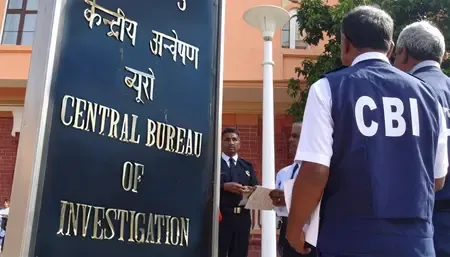Did a CBI Court in Chennai Convict Four in a ₹4 Crore Bank Fraud Case?

Synopsis
Key Takeaways
- Significant conviction against bank fraud.
- Involvement of private firms and individuals.
- Long duration of the trial highlights legal complexities.
- CBI's role in combating financial corruption.
- Importance of transparency in banking operations.
New Delhi, Nov 22 (NationPress) A specialized CBI court in Chennai has found two private companies and two individuals guilty in a bank fraud case exceeding ₹4 crore, concluding a protracted 15-year trial that initiated after Canara Bank highlighted significant discrepancies in loan disbursement, as reported by an agency official on Saturday.
The CBI disclosed that on November 21, the court sentenced Afrina Steel Rolling Mills and Basheer & Co, both private entities, to pay fines of ₹20 lakh each.
The firms were represented by their proprietor, Nazeer Ahmed, who received a sentence of seven years of rigorous imprisonment in addition to a fine of ₹40 lakh.
Another defendant, Ashik Arafath, was awarded a one-year rigorous imprisonment and fined ₹20,000. In total, the court has levied fines totaling ₹80.2 lakh on the convicted individuals.
The origins of the case trace back to September 2010 when the CBI filed a First Information Report (FIR) based on a complaint from the Chief Vigilance Officer of Canara Bank.
According to the CBI, the allegation was that the accused private entities, M/s. Afrina Steel Rolling Mills (A-1) and M/s. Basheer and Co (A-2), were partnership firms operated by Nazeer Ahmed (A-3), his spouse Fathima Riswana (A-4), and Ashik Arafath (A-6).
Investigations revealed that the accused firms—managed by Nazeer Ahmed, his spouse Fathima Rizwana, and others—conspired with senior bank officials, including Chief Manager T. Rajendran and panel valuer K.S. Ashok, during the years 2007-08.
The accused allegedly exploited the bank’s trust, submitted falsified documents, and unlawfully acquired loans and bank guarantees amounting to ₹405.47 lakh from Canara Bank’s Kilpauk branch in Chennai.
These actions resulted in considerable financial loss to the bank while generating illicit profits for the accused.
A chargesheet was filed in May 2012 against seven individuals. During the trial, two of them—Rajendran and Ashok—passed away, leading to the cessation of proceedings against them.
After extensive hearings, the court has now convicted four defendants, while Fathima Rizwana, one of the partners in the firms, has been acquitted due to insufficient evidence.
This judgment represents a significant advancement in the lengthy investigation, reaffirming the CBI’s commitment to tackling corruption and loan fraud involving collusion between private entities and banking officials.









